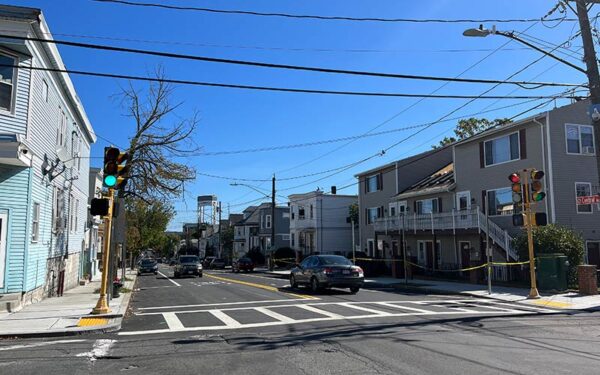
The Global Warming Solutions Act requires a decline in climate-damaging emissions. Photo Credit: Shutterstock
When is it a huge win to drop multiple lawsuits? When you’ve already won them.
Today CLF dismissed three appeals we had pending with the state’s highest court. These appeals challenged the permits for two new gas-fired power plants in Massachusetts because those permits allowed high levels of greenhouse gas emissions: levels that are illegal under the state’s Global Warming Solutions Act (GWSA).
We dropped our appeals because the Massachusetts Supreme Court recently upheld and reinforced the GWSA, the state’s landmark climate law. In doing so, the Court reaffirmed the state’s authority – and obligation – to limit the amount of carbon pollution a power plant can release into the atmosphere. And with this most recent victory, there’s no need for us to continue these individual plant lawsuits because both power plants are now covered by tough new emissions regulations. Their polluting emissions must now, by law, decline year after year through 2050.
While this month’s Supreme Court decision was a huge victory – a clear strong win for our health and our climate – it was a victory six years in the making.
We Started by Closing Coal Plants
CLF has been at the forefront of the climate fight for years, a fight which started around the pollution pouring from electric power plant smokestacks. Together with our allies, including the Massachusetts’s Department of Environmental Protection, we targeted the notorious “filthy five” coal plants, each a clear and present danger to our lungs and our climate. One by one, CLF helped to shut them down in a coordinated regional effort that has helped protect our health, our air, and our pocketbooks.
But in 2012, we were among the first to identify the next challenge: transitioning off all fossil fuels, including gas. Because while burning gas is less disastrous than burning coal, gas still emits harmful, health and climate-damaging emissions. Making the switch from coal to gas was only a first step in fighting climate change.
So after helping shutter the old Salem Harbor coal plant, CLF intervened in the approval proceedings for its proposed successor: a huge new gas-fired power plant. In fighting this plant, we won a first-in-the-nation settlement that limited the new plant’s emissions year after year, guaranteeing that it would close by 2050 if not before.
Step Two Was Legal Limits on Climate-Damaging Emissions
But even with this victory we knew that plant-by-plant limits weren’t enough. For Massachusetts to meaningfully lower its carbon emissions and combat climate change, we would need comprehensive regulations that limit emissions from all power plants in the Commonwealth. Only by doing so could we meet the dramatic emissions reductions mandated by the GWSA and needed to avoid the worst effects of climate change.
That was one reason that we sued the state in 2012 on behalf of Isabel Kain and other high school students. The plain language of the GWSA, we argued, required state agencies to issue binding emissions reduction regulations on electric power plants and more.
While that case was winding its way through the courts, we continued the fight we began in Salem Harbor. Over the next four years, CLF argued the same thing in each new power plant approval proceeding that followed: in order to comply with the GWSA, each plant’s emissions must steadily decline through 2050. And in the absence of comprehensive regulations requiring that, the state must regulate each plant individually.
The Highest Court Stands with CLF Against Climate Change
The game changed in the summer of 2016 after a unanimous Supreme Judicial Court of Massachusetts (SJC) ruled in favor of CLF and Isabel Kain. The court agreed with us across the board: the emissions reduction mandates in the Global Warming Solutions Act are both real and legally binding, so state agencies must issue regulations to ensure emissions decline steadily and dramatically each year through 2050.
By the time this landmark decision was announced, our cases against the two gas plants had concluded and were already on appeal at the Supreme Judicial Court. In each case, we had argued exactly what we argued in the Kain case: that the GWSA set enforceable, binding emissions limits and, in each case, the state’s permit failed to adequate limit future emissions.
And after the ruling in the Kain case, it was clear to everyone that CLF’s argument was correct. So the state got to work on exactly what we had called for years before: setting binding, statewide emissions limits through 2050 on all large power plants in the state.
A Final Challenge from a Dying Industry
Our story should have ended there. The state issued statewide emission caps in late 2017, and power generators should have accepted them as law. But instead, a trade association for New England power generators filed a lawsuit challenging the new regulations. Their attack was two-fold: arguing that the state lacked the authority to cap in-state power plant emissions and (strangely enough) that by forcing them to emit less, the state risked instead increasing carbon pollution.
When we first wrote about this challenge we told you we thought the power plant challenge was “pretty weak – the last gasps of a dirty, dying industry.” As a “friend of the court,” we argued much the same to the Supreme Judicial Court, urging them to uphold the new regulations and the state’s authority to issue them.
Earlier this month, the Court – again with clear and unambiguous unanimity – agreed with us and rejected the power industry’s challenge. In its decision, the Court ordered the power plants to fully comply with the new emissions cap regulation which, according to the Court “was properly promulgated, has the force of law, and must be accorded all the deference due to a statute.” We couldn’t have said it better ourselves.
With enforceable emissions reductions now in place for electric power plants – a framework we’ve called for over the past six years – we can (and have) dismissed our individual gas plant appeals. A huge amount of work remains if we are going to stop climate change and transition Massachusetts to a healthy and thriving clean energy economy. But for the time being, our work with these plants is done.
As we said before: R.I.P. fossil fuels. Clean energy is the law here.



